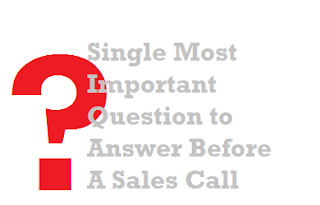 Do you know that a sales rep has to answer, at least, 100 additional questions before he or she makes a sales call? Working with the sales manager makes it even worst! There will be more questions to answer on top of the routine questions...
Do you know that a sales rep has to answer, at least, 100 additional questions before he or she makes a sales call? Working with the sales manager makes it even worst! There will be more questions to answer on top of the routine questions......questions like: what's the call objective? What was discussed during the previous call? What kind of commitment achieved? And on, and on, and on...
...but do you know that, actually, there are only ONE question sales reps need to answer before every sales call?
And if you know what this question is, you'll be pleased that you read this post right to the end.
And your sales result will agree with you too.
In fact, your customers will look up to you with respect and will want to do business with you even if your offer is much higher priced than the competitors.
Interested? Read on...
A product or service that you're promoting is going to offer something of value to customers.
But already know about this, right?
What you don't know is, every time you asked the question: "What's in it for me?", you're actually setting your mindset in the "wrong" direction.
It's not apparent in the first glance but just think about it...
Salespeople are supposed to satisfy customers' need or solved their problems. So, when they asked the question above, their mind will actually look for what's in it for THEM!
And salespeople look for closing sales, more significant commission, higher sales incentive, and so on...
...so what's in it for YOU, the customer?
Hence, the best thing to shift right now is the orientation of the question...
...from "what's in it for me?" to "what's in it for you?".

Try this, right now.
Take your product, select its best benefit, and imagine saying to the customer: "So, what's in it for you is..."
Feel the difference? Can you see it?
And that's the most critical question to ask, before making sales call. Forget your past training, make the shift to asking "what's in it for you" more often.
Salespeople have been focusing on the wrong end for far too long. A small shift in focus will bring about huge, massive change on the result.
It did, for me. And I know it can do the same, if not better, for you.
Put it to the test...right now!
What A Bad Pharmaceutical Sales Call Looks Like?
This question forces me to think long and deep, and you know why?
Because the definition of "bad" can take you everywhere.
I can approach this from a medical sales rep point of view, or I can look at it from the company's perspective.
But then again, which point of view matter?
Well, after giving it much thought, I've decided to look at this from a salesperson point of view, which, in my humble opinion, is all that matters.
And if you want to choose the other point of view, well, shame on ya company's minion (ha! ha! ha!)
I can tell you a bad sales call does not start from planning.
Yes:
Salespersons had been told for years that "if they fail to plan, they plan to fail."
Imagine that, years!
A salesperson best plan is to be flexible.
The best salespersons arise to the occasion when they need to.
More often than not, a sales situation is very different from what has been planned.
I can hear some sales managers said that:
"It couldn't be that sales situation always different from a plan?"
My answer to that is:
"When was the last time you follow your rep to the field?"
I can bet my bottom dollar that the sales manager's answer is "a very very very long time ago" ...
... Or since sales managers are known to cheat and not telling the whole truth just to save their backside, will just say "very recently" and we instantly knew that it was not valid.
Shame on them and they have no idea what the market is like.
Maybe I want to digress a bit here:
Many salespersons will tell you that they wish their boss will spend more time with them on the field, especially the higher ranking bosses.
But:
They know it would not merely happen unless, well, the reps wear skirts!
During my service back in 2008 to 2010 with a pharma company, a survey done within the company globally showed that salespersons want their managers to spend more time with them and their customers.
Back then, sales managers presence could "facilitate" sales, and perhaps, that drives the intention of the reps as reflected by the survey.
Back to our subject of discussion:
Good, solid planning does not guarantee a sales call to turn out fantastic.
If a salesperson is flexible enough to move around a sales situation, which mostly, not according to plan, he or she will enjoy making sales calls.
That's how you can tell whether it was a right call or otherwise.
From this:
You can read between the lines and conclude that bad sales call will almost dampen a salesperson next call. They get discouraged and demotivated to move on to the next call.
To put it in simple words:
A bad sales call looks like a massive wall that stands between a sales rep and the next sales call, regardless of the outcome of the sale.
Maybe a sales call does not result in actual sales, perhaps, just a commitment to move on to the next step but its progress, and inevitably it propels the rep to call upon the customer or prospect again.
Other than that, it's a terrible sales call.
Get it?

No comments:
Post a Comment